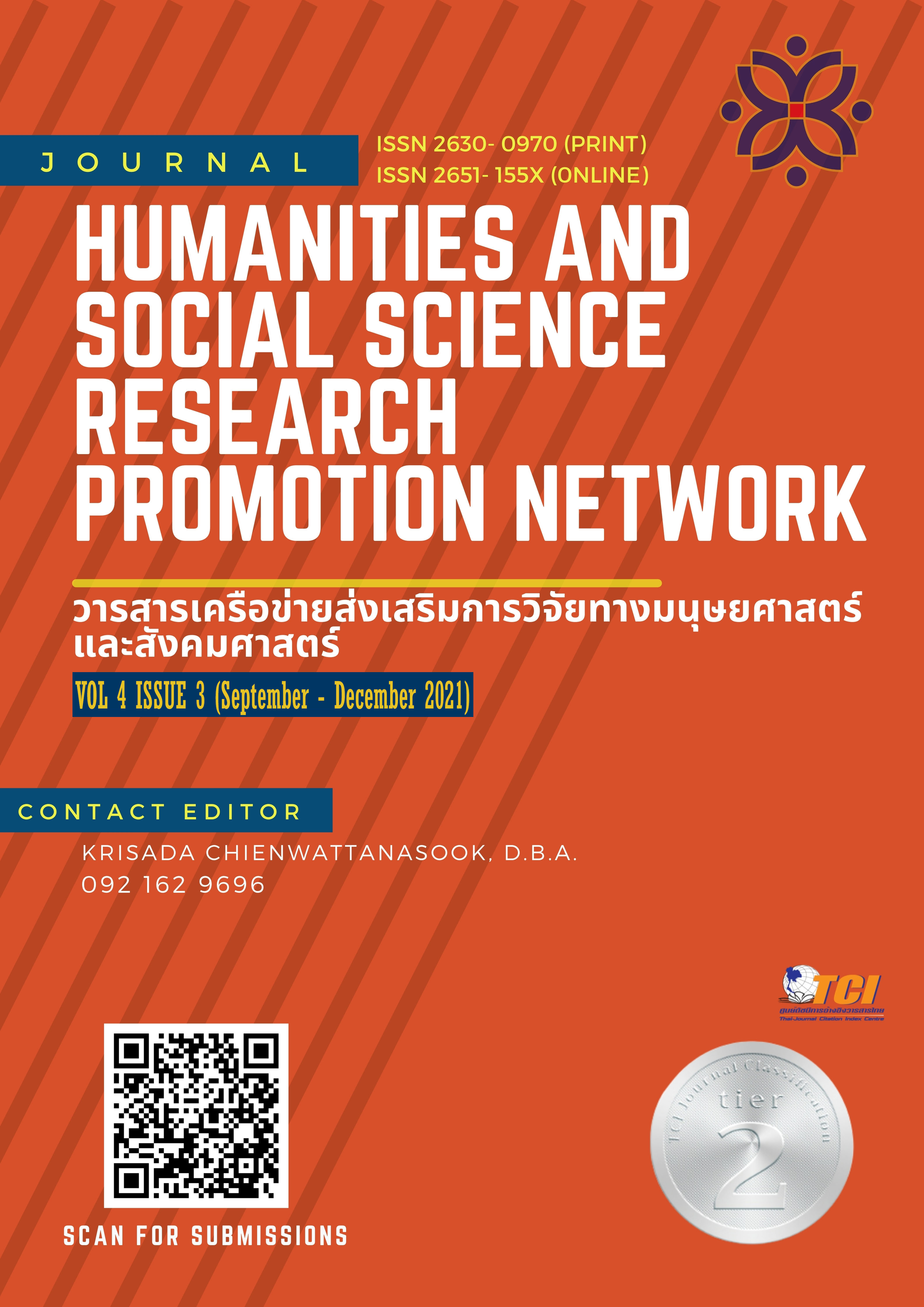รูปแบบองค์กรที่เหมาะสมกับการดำเนินธุรกิจให้สามารถพึ่งพาตนเองได้ กรณีศึกษา: ศูนย์พัฒนาและบริการกสิกรรม แขวงสะหวันนะเขต สาธารณรัฐประชาธิปไตยประชาชนลาว
คำสำคัญ:
รูปแบบองค์กร, การพึ่งพาตนเอง, ศูนย์พัฒนาและบริการกสิกรรม, สะหวันนะเขตบทคัดย่อ
การวิจัยนี้มีวัตถุประสงค์เพื่อกำหนดรูปแบบองค์กรที่เหมาะสมกับการดำเนินธุรกิจให้สามารถพึ่งพาตนเองได้ เป็นงานวิจัยเชิงคุณภาพ โดยศึกษาจากผู้ให้ข้อมูลสำคัญ 2 กลุ่ม เครื่องมือที่ใช้เป็นแบบสัมภาษณ์เชิงลึก ผลการวิจัย พบว่า รูปแบบองค์กรที่เหมาะสมกับการดำเนินธุรกิจให้สามารถพึ่งพาตนเองได้ มีดังนี้ รูปแบบโครงสร้างองค์กรแบบคณะที่ปรึกษาเป็นรูปแบบที่เหมาะสมมาปรับใช้ การจัดการการผลิตในด้านการพัฒนาเทคโนโลยี นำเทคโนโลยีระดับพื้นฐานมาใช้ในการเรียนการสอน การฝึกอบรม การเพิ่มผลผลิต การสร้างตราสินค้า หรือบรรจุภัณฑ์ให้เป็นอัตลักษณ์ รวมทั้งการนำสื่อโซเซียล มิเดีย มาใช้ในการโฆษณา ประชาสัมพันธ์ หรือติดต่อลูกค้า ด้านการผลิต มีการสร้างเครือข่ายในการผลิต เพื่อให้ศูนย์สามารถผลิตสินค้าได้ทัน และป้องกันการผลิตหยุดชะงักเนื่องจากผลผลิตขาดแคลน ด้านการวางแผนการจัดจำหน่าย มีการจัดโครงการเกษตรสัญจร เพื่อทำให้เกิดการเข้าถึงลูกค้าในกลุ่มเป้าหมายอื่นๆ ด้านการบริหารสินค้าคงคลัง โดยนำระบบการเข้าก่อนออกก่อน มาใช้ในการดำเนินการ ด้านการตลาด มีการจัดหาเครือข่ายชุมชน เพื่อกระจายสินค้า การพัฒนากิจกรรมที่สำคัญของศูนย์ในแต่ละหน่วยธุรกิจ มีดังนี้ สำหรับหน่วยงานพืชและป่าไม้ ควรผลิตพันธุ์พืช พันธุ์ไม้ ที่มีราคาถูกจำหน่ายให้เกษตรกรได้ทดลองปลูก และขยายพันธุ์พืช สำหรับหน่วยงานสัตว์ ควรผลิตสินค้ากับความต้องการของผู้บริโภคของประชาชนในชุมชนเป็นหลัก สำหรับหน่วยงานข้าว โดยการเน้นการผลิตพันธุ์พื้นเมืองแท้สนับสนุนให้เกษตรกรปลูกในพื้นที่ได้ทดลองปลูก สำหรับหน่วยงานดิน เน้นการพัฒนาคุณภาพดินเพื่อให้สามารถปลูกพืชเศรษฐกิจตามความต้องการของตลาด และหน่วยงานชลประทาน มีการจัดหาแหล่งน้ำและจัดการน้ำให้เพียงพอ
เอกสารอ้างอิง
Anyanwu, C. (1992). Community development: the Nigerian perspective. Ibadan: Gabesther Educational Publishers.
Ayompe, L. M., Schaafsma, M., & Egoh, B. N. (2021). Towards sustainable palm oil production: The positive and negative impacts on ecosystem services and human wellbeing. Journal of cleaner production, 278, 123914.
Bangmo, S. (2002). Organization Management (3rd edition). Bongkok: WITTHAYAPHAT Co., Ltd.
Boonyarat, N., & Thammapipon, S. (2017). Building a network of chestnut farmers at Suphanburi Province. Journal of Management and Development Ubon Ratchathani Rajabhat University, 4(2), 1-19.
Chaipattana Foundation. (2019). Sufficiency Economy. Retrieved from https://www.chaipat.or.th/publication/publish-document/sufficiency-economy.html
Chaisen, K. & Thong-In, N. (2018). The Study of Inventory Management withFIFO System Case Study : Betagro Public., Ltd. Bangkok: Attawit Commercial Technology College.
Chernova, V. Y., Zobov, A. M., Degtereva, E. A., Starostin, V. S., & Andronova, I. V. (2020). Sustainable economy: evaluation of food self-sufficiency in Russia. Entrepreneurship and Sustainability Issues, 7(3), 1541.
Dararuang, K. (2017). Development of Product and Market Strategy for Ban Kao Lame Community Enterprise, Nakhonsawan Province. Suthiparithat, 31(100), 130-143.
Department of Public Relations. (1999). Compilation of Royal Projects under the Royal Patronage of His Majesty the King on the auspicious occasion of His Majesty the King the Year 6 Cycle 5 December 1999.
Fayol, H. (1949). General and Industrial Management. London: Sir Isaac Pitman & Sons.
Fonchingong, C. C., & Fonjong, L. N. (2002). The concept of self-reliance in community development initiatives in the Cameroon grassfields. GeoJournal, 57(1), 83-94.
Foundation, C. (2019). Sufficiency Economy. Retrieved from https://www.chaipat.or.th/publication/publish-document/sufficiency-economy.html
Galtung, J. (1980). On the technology of self‐reliance (pp. 223‐246). In Galtung, J.; O’Brien, P.; & Preiswerk, R. (Eds.). Self‐reliance: A strategy for develop. Institute for Development Studies, Geneva: Bogle‐L'Ouverture Publications.
Jaikla, S. (2018). The Model of Development and Promotion for Sustainability of Social Enterprises in Thailand. Journal of MCU Nakhondhat, 5(2). 342-363.
Jansom, N. (2019). Sufficiency Economy Principles of Sustainable Development. Academic Journal of the Graduate Institute Development Administration Science. 5.
Jesadalak, W., Trichan, K., & Rangsungnoen, T. (2015). Ways of life under the Philosophy of Sufficiency Economy in Chang Hua Man Royal Initiative Project: A case study of Ban Nong Kho Kai farmers in Phetchburi province. Veridian E-Journal, Slipakorn University, 8(2), 1114-1125.
Juijaingam, J. & Teppaya, P. (2014). Trend of Social Enterprise in case of Success and Failure. Bangkok: Post Publishing.
Junkrapor, M. & Chienwattanasook, K. (2019). Establishing an Innovative Organization to Drive towards the Organizational Excellence. Executive Journal, 39(1), 52-66.
Kongpetdit, C. & Chantuk, T. (2016). Developing Account Executives’ Communication Skills in Advertising Industry. Veridian E-Journal, Silpakorn University (Humanities, Social Sciences and arts), 9(2), 14-32.
Kotler, P. (1984). Marketing Management: Analysis, Planning, and Control. New Delhi: Prentice-Hall of india.
Krongsiri, I. (2019). Sustainable Management Model for Self-reliant Community: A Case Study of the Ethnic Chong, Klongplu, Kho Khitchakut District, Chanthaburi Province. Journal of Government Management and Private Sector, 21(2), 74-101.
Lalaeng, C., Chaiphet, C., & Uea-aree, W. (2018). Business Networking Development and Competitive Advantage of Community Enterprise in Chumphon Province. Veridian E-Journal, Silpakorn University (Humanities, Social Sciences and arts), 11(8), 3447-3464.
Liu, Q., Luo, D., Haase, J. E., Guo, Q., Wang, X. Q., Liu, S., ... & Yang, B. X. (2020). The experiences of health-care providers during the COVID-19 crisis in China: a qualitative study. The Lancet Global Health, 8(6), e790-e798.
Meesubthong, C., Jadesadalug, V., & Sansook, J. (2018). Learning Organization Competencies and Innovation Capabilities: An Empirical Evidence of Thailand Textile Industry. Business Review, 10(2), 197-216.
Meesubthong, C., Jadesadalug, V., & Sansook, J. (2018). Learning Organization Competencies and Innovation Capabilities : An Empirical Evidence of Thailand Textile Industry. Business Review Journal, 10(2), 197-216.
Office of Trade and Investment Cooperation Department of Foreign Trade. (2014). Border trade statistics and Investment in Lao PDR. Ministry of Commerce.
Puangsang, M. & Muttanang, Y. (2020). Marketing Promotion Guidelines for Banbuengwomen Communityenterprise, Tambonban Bueng, Amphoe Ban Kha, Ratchaburi. Panyapiwat Journal, 12(2), 55-66.
Rosa-Schleich, J., Loos, J., Mußhoff, O., & Tscharntke, T. (2019). Ecological-economic trade-offs of diversified farming systems–a review. Ecological Economics, 160, 251-263.
Santiwong, T. (2000). Management Principles. Bangkok: Thaiwatanapanich Publisher.
Santucci, F. M. (2005). Strategic communication for rural development. World Bank.
Sereerat., et al. (2002). Organization and Management. Bangkok: Thammasarn Printing House.
Sereerut, s., Hirankitti, s., Vanichayaporn, s. (2002). organization and management. Bangkok: Dharmasarn Printing Co.,Ltd.
Srichampa, S. (2015). India and Thailand: Soft Power Ties. Humanities, Arts and Social Sciences Studies (Former Name Silpakorn University Journal of Social Sciences, Humanities, And Arts), 15(3), 121-150.
Supachariyawat, A., Supichayangkul, S., & Sangayothin, T. (2019). Organization Structure Format, Human Resource Management, Technology and Management that Enables Selling Products of Pracharat Schools. BU Academic Review, 18(1), 84-97.
Supasaktumrong, C. (2018). The Roles of Management in Human Resource Development. Veridian E-Journal, Silpakorn University (Humanities, Social Sciences and arts), 11(2), 1702-1713.
Wittayaudom, W. (2011). Organization Theory. Bangkok: Thanat Publishing.
ดาวน์โหลด
เผยแพร่แล้ว
รูปแบบการอ้างอิง
ฉบับ
ประเภทบทความ
สัญญาอนุญาต
บทความที่ได้รับการตีพิมพ์เป็นลิขสิทธิ์ของ ผู้เขียน
ทัศนะและความคิดเห็นที่ปรากฏในบทความในวารสารเครือข่ายส่งเสริมการวิจัยทางมนุษยศาสตร์และสังคมศาสตร์จะถือเป็นความรับผิดชอบของผู้เขียนบทความนั้น และไม่ถือเป็นทัศนะและความรับผิดชอบของกองบรรณาธิการ








